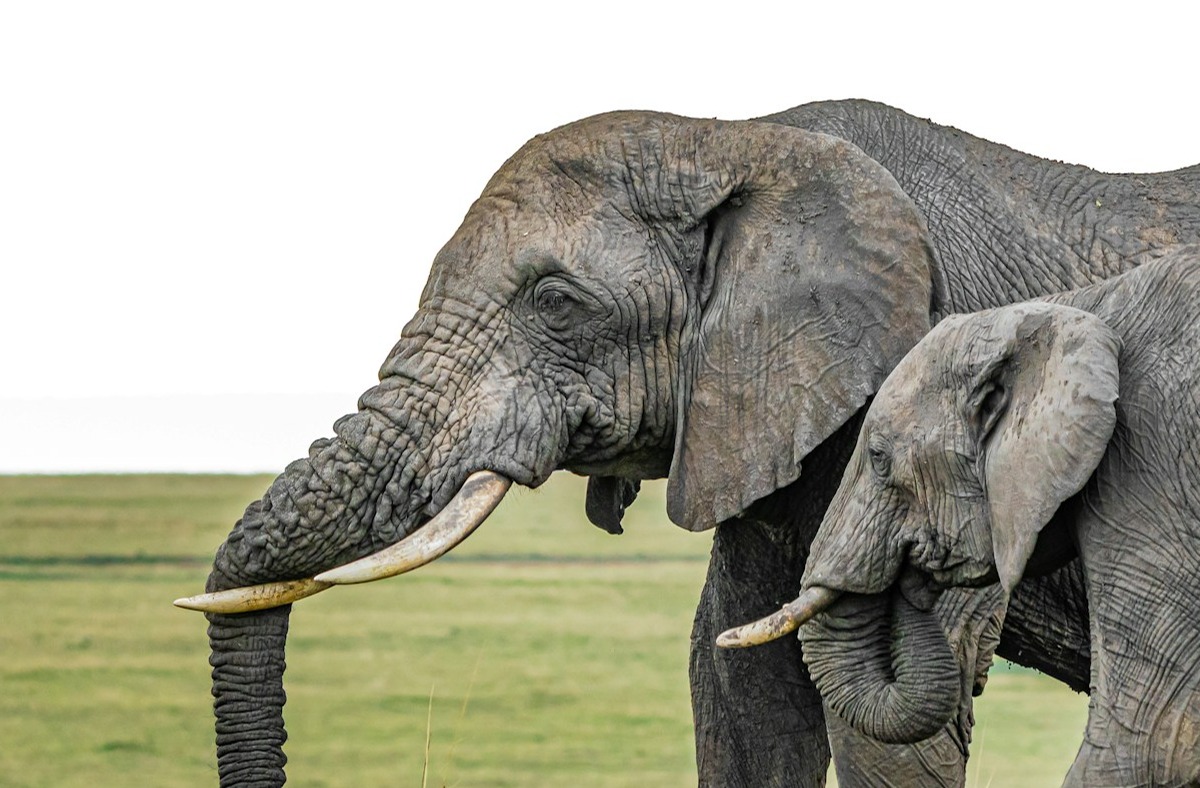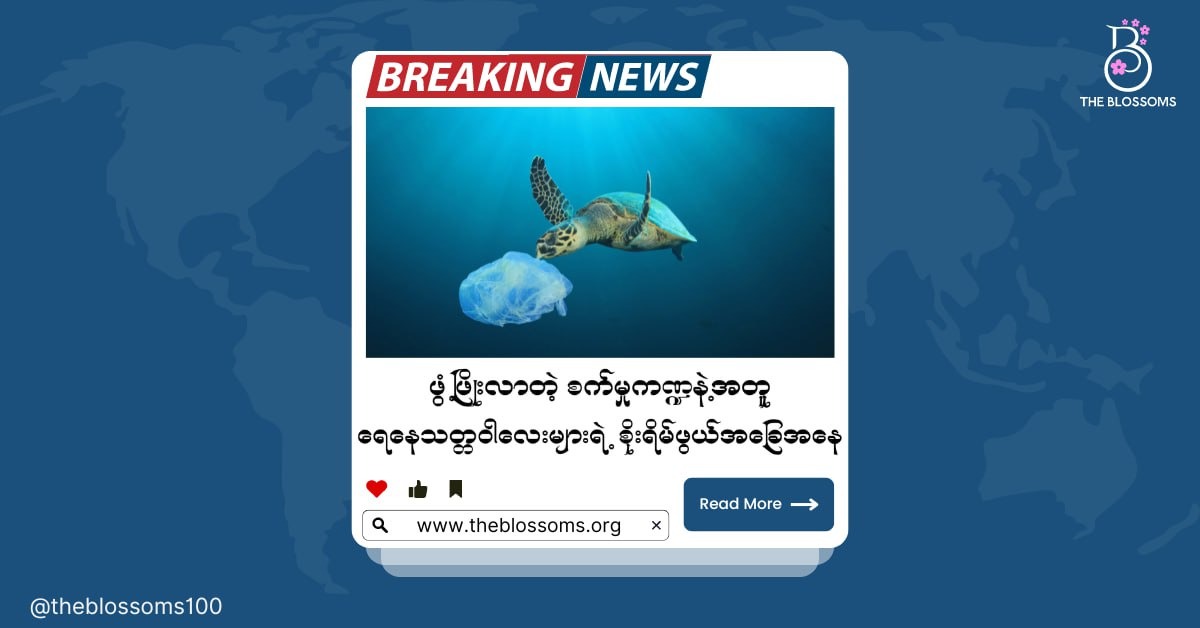မေ့လျော့နေကြသောအန္တရာယ် (မျိုးစိတ်ရှားပါးလာခြင်း)
မျိုးစိတ်ရှားပါးလာခြင်းအန္တရာယ်ဆိုတာဘာလဲ။
ကမ္ဘာပေါ်ကအချို့မျိုးစိတ်တွေဟာ တစ်ကောင်နှစ်ကောင်၊ ဒါမှမဟုတ် အနည်းငယ်သာသာကျန်တော့တာသင်သိပါသလား။ မျိုးသုဉ်းရန်အန္တရာယ်ရှိတဲ့မျိုးစိတ်တွေဟာ လူ (သို့မဟုတ်) ပြင်ပ သက်ရောက်မှုတစ်ခုခုကြောင့် နေရင်းဒေသအတွင်းရှိ ဇီဝမျိုးစိတ်တစ်မျိုးရဲ့အရေအတွက်တွေက စံသတ်မှတ်ချက်များအရ အလွန်အမင်းကျဆင်းနေတာလို့ ဆိုလိုခြင်းဖြစ်ပါတယ်။ မျိုးစိတ်တိုင်းဟာ ကျွန်တော်တို့သက်ရှိသက်မဲ့တွေရဲ့မရှိမဖြစ် အသက်သွေးကြောပါပဲ။ ဒါပေမဲ့ လူတွေ၊ ကျွန်တော်တို့တွေရဲ့ပယောဂကပဲ အချင်းချင်းမှီခိုနေတဲ့ မျိုးစိတ်တွေကို မျိုးသုဉ်းသွားအောင်၊ ရှားပါးလာအောင် တဖြည်းဖြည်းလုပ်ယူနေကြပါတယ်။ အဲ့ကနေ Biodiversity ပြိုကွဲပျက်စီးလာမှန်းမသိ ပျက်စီးဆုံးရှုံးလာခဲ့ရာမှ ကျွန်တော်တို့နဲ့ ကျွန်တော်တို့ရဲ့အနာဂတ်မျိုးဆက်တွေအတွက် ခြိမ်းခြောက်မှုကြီးဖြစ်လာပါတော့တယ်။
ဘာကြောင့်မျိုးစိတ်တွေရှားပါပျောက်ကွယ်နိုင်တဲ့အန္တရာယ်ဖြစ်ပေါ်နေတာလဲ။
မျိုးစိတ်များရှားပါးလာသောအန္တရာယ်ဖြစ်စေသည့် အဓိကအကြောင်းရင်းတစ်ခုမှာ စားကျက်မြေများပျက်စီးခြင်းပင်ဖြစ်သည်။ လူသားများ တိုးပွားလာသည်နှင့်အမျှ ကျွန်တော်တို့ဟာ နေထိုင်ရာနေရာများကို တိုးချဲ့ဖို့ သစ်တောများခုတ်ထွင်ရှင်းလင်းပြီးစိုက်ပျိုးရေး နဲ့ မြို့ပြဖွံ့ဖြိုးရေးနေရာတွေအဖြစ်ပြောင်းလဲလိုက်ကြရပါတယ်။ မျိုးစိတ်များစွာရဲ့ကျက်စားရာနေရာတွေ ဆုံးရှုံးခြင်းဟာ ဂေဟစနစ်များကို ထိခိုက်စေပြေီး သူတို့အတွက်အစာအရင်းအမြစ်များကို ဆုံးရှုံးစေတာကြောင့် တဖြည်းဖြည်းပျောက်ကွယ်လာကြကာ ရှားပါးမျိုးစိတ်များဖြစ်လာကြပါတယ်။
ပြီးတော့ လေထု၊ ရေနဲ့ မြေဆီလွှာညစ်ညမ်းမှုစတဲ့ အမျိုးမျိုးသော ညစ်ညမ်းလာမှာတွေဟာ အဏ္ဏဝါမျိုးစိတ်များ အပါအဝင် အပင်နှင့် တိရစ္ဆာန်မျိုးစိတ်များ၏ ကျန်းမာရေးကို ထိခိုက်စေပါတယ်။ ရာသီဥတုဖောက်ပြန်ခြင်းကလဲ မျိုးသုဉ်းလုနီးပါးမျိုးစိတ်တွေကို အပူချိန်လွန်ကဲခြင်းကြောင့် ရွေ့ပြောင်းနေထိုင်ဖို့၊ အလျင်အမြန်လိုက်လျောညီထွေဖြစ်အောင်နေနိုင်ဖို့စသဖြင့် အတင်းအကျပ်တွန်းအားပေးသလိုဖြစ်လာပြီး ရာသီဥတုပြောင်းလဲမှုရဲ့ အရှိန်အတိုင်းလိုက်မထိန်းနိုင်တဲ့အခါမှာ ၎င်းမျိုးစိတ်တွေဟာတဖြည်းဖြည်း ပျောက်ကွယ်လုနီးပါး ဖြစ်လာပါတော့တယ်။ အထင်ကရမျိုးစိတ်များဖြစ်တဲ့ ဆင်၊ကြံ့နဲ့ ရှားပါးကျားမျိုးစိတ်အများအပြားကို တရားမဝင် မှောင်ခိုရောင်းဝယ်မှုနှင့် တရားမဝင်ရောင်းဝယ်ဖောက်ကားမှုများ ပြုလုပ်ဆဲဖြစ်ပါတယ်။ ထိုတိရိစ္ဆာန်များရဲ့ အစွယ်များ၊ ဦးချိုများနှင့် အရေခွံများအတွက် ဝယ်လိုအား မြင့်မားခြင်းကြောင့် တိုင်းရင်းဆေးဖော်တာ၊ ဇိမ်ခံပစ္စည်းအလှဆင်ပစ္စည်းအဖြစ် သို့မဟုတ် တစ်ချို့ကအိမ်မွေးတိရစ္ဆာန်များအဖြစ် မွေးမြူကြပါသေးတယ်။ကမ္ဘာလုံးဆိုင်ရာအဖွဲ့အစည်းမျာစွာကတားစီးနေပေမဲ့လဲ တရားမဝင်မှောင်ခိုပြုလုပ်နေသေးကြတဲ့အတွက် မျိုးသုဉ်းရန် နီးကပ်လာသည့် မျိုးစိတ်များထဲပါဝင်လာပါတယ်။ လွန်ကဲစွာအမဲလိုက်ခြင်း၊ ငါးအလွန်အကျွံဖမ်းခြင်းနဲ့ ကျူးကျော်မျိုးစိတ်များဝင်ရောက်လာခြင်းတွေကလဲ မျိုးစိတ်ရှားပါးပျောက်ကွယ်လာမှုရဲ့ အကြောင်းရင်းတွေပါပဲ။
မျိုးသုဉ်းလုနီးပါးမျိုးစိတ်တွေကို ဘယ်လိုထိန်းသိမ်းကာကွယ်ကြမလဲ။
မျိုးသုဉ်းလုနီးပါးမျိုးစိတ်များကို ကာကွယ်ဖို့ဆိုတာ ကျွန်တော်တို့အမှီသဟဲပြုနေတဲ့ ဇီဝမျိုးစုံမျိုးကွဲများကို ပြန်ထိန်းသိမ်းဖို့ ဂေဟစနစ်ကို ထိန်းသိမ်းစောင့်ရှောက်ဖို့အတွက်ပါပဲ။ အဲ့အတွက်ဆိုဆိုရင်တော့ ကျွန်တော်တို့ဟာ နည်းဗျူဟာများကိုစနစ်တကျရေးဆွဲပြီး လက်တွေ့အသုံးပြုဖို့လိုပါတယ်။
၁။ စားကျက်မြေတွေတောတောင်တွေကိုကာကွယ်မယ်။ မျိုးသုဉ်းလုနီးပါးမျိုးစိတ်များကိုထိန်းသိမ်းပြီး သူတို့ကျက်စားတဲ့နေရာတွေကို ပြန်လည်ထူထောင်ရပါမယ်။
၂။ ဥပဒေနဲ့လုပ်ဆောင်မယ်။
အမဲလိုက်ခြင်း၊ တရိစ္ဆာန်ရောင်းဝယ်ဖောက်ကားခြင်းကိုတရားဥပဒေပြဌာန်းတားဆီးမယ်။ မျိုးသုဉ်းလုနီးပါးမျိုးစိတ်တွေနေထိုင်တဲ့တောတောင်နေရာတွေကို အန္တရာယ်ပြုခြင်းအတွက် ဥပဒေများ ပြဋ္ဌာန်းမယ်။
၃။ စောင့်ကြည့်ခြင်းနှင့် သုတေသနပြုခြင်းများလုပ်ဆောင်မယ်။
များစွာသောမျိုးစိတ်တွေရဲ့အရေအတွက်၊ သူတို့ရဲ့လိုအပ်ချက်နဲ့ သဘောတရားတွေ မျိုးတုန်းရှားပါးလာနိုင်တဲ့ဖြစ်နိုင်ခြေတွေကို နားလည်ရန် သုတေသနပြုလုပ်မယ်။
၄။ ရှားပါးလာတဲ့မျိုးစိတ်တွေအကြောင်း လူထုအသိပညာပေးခြင်းပြုလုပ်မယ်။
မျိုးစိတ်အားလုံးနဲ့ပတ်သက်တဲ့ ဇီဝမျိုးစုံမျိုးကွဲများရဲ့ အရေးပါမှုကို လူထုအား အသိပညာပေးခြင်းနှင့် ထိန်းသိမ်းရေးအတွက် အထောက်အကူဖြစ်စေရန် လှုံ့ဆော်ပေးမယ်။ ဟောပြောပွဲတွေလုပ်မယ်။
၅။ ထိန်းသိမ်းမွေးမြူမယ်၊ ပြန်လည်ပျိုးထောင်မယ်။
ထိန်းသိမ်းခံရတဲ့ မျိုးစိတ်များကို မွေးမြူပြီး အရေအတွက်တိုးပွါးလာစေဖို့ သူတို့ရဲ့မူလနေရာတောရိုင်းထဲသို့ ပြန်လည်ပို့ဆောင်ပြီးစောင့်ကြည့်ထိန်းငိမ်းမယ်။
၆။ နိုင်ငံတကာအဖွဲ့အစည်းများနဲ့ ပူးပေါင်းဆောင်ရွက်မယ်။
နိုင်ငံနယ်နမိတ်စပ်ကြားနဲ့ ကျော်လွန်သော မျိုးစိတ်မတွေကို ကာကွယ်ဖို့ သဘောတူညီချက်များပြုလုပ်ပြီး ပူးပေါင်းဆောင်ရွက်မယ်။ NGO, INGOတွေနဲ့လက်တွဲမယ်။
၇။ ရပ်ရွာအတွင်းထိန်းသိမ်းစောင့်ရှောက်မယ်။
မျိုးစိတ်ရှားပါးလာခြင်းထိန်းသိမ်းကာကွယ်ရေး ကြိုးပမ်းမှုများအတွက် ပံ့ပိုးကူညီမှုများ ရရှိစေရန် ရေရှည်တည်တံ့သော ပံ့ပိုးပေးခြင်း၊ ပညာပေးခြင်းဖြင့် ဒေသခံလူထုအား ပူးပေါင်းပါဝင်မယ် ဆိုရင်
ကျွန်တော်တို့ဟာ မျိုးစိတ်ရှားပါလာတဲ့အန္တရာယ်ကိုကာကွယ်ပြီးသားဖြစ်ပြီး တစ်နည်းအားဖြင့် ကျွန်တော်တို့အနာဂတ်မျိုးဆက်များရဲ့ ကမ္ဘာကိုပိုပြီးသာယာလှပလုံခြုံစေမှာပဲဖြစ်ပါတယ်။
(English version)
Saving the Forgotten (The Endangered Species)
What are endangered species?
Do you know that there are some species only a few of them are left in the whole world?? Endangered species means that the number of a biological species in its habitat has declined significantly according to criteria due to human or other external influences.
Every species plays a vital role. However, human activities have accelerated the rate of extinction, putting many species on the brink of disappearance. The issue of endangered species is not just about the loss of biodiversity; it’s a reflection of our impact on the planet and a warning of the potential consequences for future generations.
What causes the endangered species?
One of the primary causes of species endangerment is habitat destruction. As human populations grow, we encroach upon natural habitats, clearing forests, draining wetlands, and converting land for agriculture or urban development. This loss of habitat disrupts ecosystems, depriving species of their homes and sources.
Pollution, encompassing air, water, and soil pollution, adversely affects the health of a wide range of plant and animal species, including marine life. Climate change exacerbates the challenges, posing significant threats to endangered species. Many species cannot keep pace with the rapid rate of climate change, forcing them to move and adapt quickly for survival, which often results in population declines and, ultimately, endangerment. Poaching and illegal wildlife trade further threaten many iconic species such as elephants, rhinoceroses, and tigers. Driven by high demand for their tusks, horns, and skins—used in traditional medicines, luxury goods, or kept as exotic pets—these activities continue to push these species closer to extinction, despite global efforts to halt these practices. Moreover, over hunting, overfishing and invasive species ( which fight the native species for their habitats and sources) are also causes of endangered species around the world.
How can we protect this?
Protecting endangered species is crucial for maintaining biodiversity and preserving our planet’s ecological balance. To achieve this goal, conservation efforts employ a variety of strategies:
1. Habitat Protection: Preserve and restore natural habitats to safeguard endangered species.
2. Legal Protection: Enforce laws against hunting, trading, or harming endangered species and their habitats.
3. Monitoring and Research: Track populations and habitats, and conduct research to understand species' needs and threats.
4. Public Awareness: Educate the public about biodiversity's importance and inspire support for conservation.
5. Captive Breeding and Reintroduction:
Breed endangered species in captivity and reintroduce them into the wild to boost populations.
6. International Cooperation: Collaborate across borders through agreements to protect species that transcend national boundaries.
7. Community Engagement : Involve local communities by providing education and incentives for sustainable practices to garner support for conservation efforts.
By implementing these strategies collectively, we can make significant strides in protecting endangered species and preserving the rich tapestry of life on Earth.
 THE
THE 

-v1.jpg)
